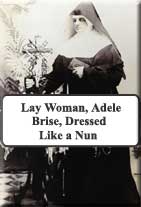Some concerns regarding the alleged Marian apparition approved by a U.S. bishop in 12/10 were recently shared with a faithful priest. The priest reviewed the concerns and agreed that some elements involving the alleged apparition in Wisconsin appear 'strange'. If nothing else, it seems the following items at least deserve an adequate answer...
* Why is it that the alleged visionary in Wisconsin, Adele Brise, never took religious vows, yet she dressed in a habit and is referred to as "Sr. Adele"? The image of Adele wearing a habit is used to promote the shrine (see one such image below), and the laywoman's appearance as a 'nun' may therefore give an apparent air of credibility to the alleged apparition. Even her tombstone refers to her as "sister", yet she took now religious vows. Why is this?

* Why did the apparition instruct a lay woman, rather than a priest or religious, to "Gather the children in this wild country and teach them what they should know for salvation". In contrast, Jesus instructed certain males (e.g. priests) - not women - to teach. As Pope John Paul II stated: "Priestly ordination, which hands on the office entrusted by Christ to his Apostles of teaching, sanctifying and governing the faithful, has in the Catholic Church from the beginning always been reserved to men alone" (emphasis added). St. Paul says, "A woman must receive instruction silently and under complete control. I do not permit a woman to teach or to have authority over a man. She must be quiet." (1 Tm. 2:11-12) So, does it not seem strange that in a place where the Catholic Church was already established, an apparition would call on a lay woman - rather than the parish priest - to (apparently independently) teach other peoples' children "what they should know for salvation"? If the priest wasn't doing his job of teaching the children, why did the apparition not appear to him or to his bishop? Also, the apparition apparently did not instruct the lay woman to clear her new 'teaching assignment' with the parish priest or other Church authorities, the authentic instructors of the faith. Isn't that rather odd?
* Why was approval of the apparition referred to as a 'thank you' to Adele Brise, rather than simply an objective determination made after careful evaluation of the alleged apparition's authenticity? (Note: The bishop said "In many ways it is also a thank-you gift to Adele Brise, that Belgian immigrant who came here to this country...")
* Why did the bishop also give other reasons for approving the apparition which have nothing to do with authenticity? (Note: Reasons included these two: "My love for the Blessed Mother, and the simple messages to get the faith out there") Why would approval be given for any other reason than that the apparition was found to be authentic?
* Isn't it true that an examination conducted around 150 years after the fact may make it difficult for a careful review of contradictory evidence? (Note: By contrast, the Marian apparition Lourdes occurred less than two years earlier and was approved quickly by the Church)
* Why does the description of the Blessed Virgin's hair seem so unusual (she reportedly had "long, golden, wavy hair" which "fell loosely around her shoulders")? Also, isn't it rather odd that the description and associated image do not indicate that the Blessed Virgin wore a veil?
* Could the timing of the approval be considered strange / opportune since the diocese is embroiled in abuse scandals? (Note that the diocese was recently charged with obstruction of justice for allegedly destroying evidence related to abuse cases, but the diocese denies the claims and the bishop denies that the scandals influenced his decision regarding the apparition)
* Isn't it true that while some associated miracles may seem impressive, it is possible that they could be explained by natural means or as answers to prayers which were unrelated to the alleged apparition?
Especially in light of the various false alleged apparitions in recent times - and the large number of people willing to follow them - it seems especially important for the bishop to provide good answers to questions such as those above.
"The devil is most pleased when he sees that people desire to accept revelations and are inclined toward them. For then he has an excellent opportunity to inject errors and disparage faith as much as possible." (St. John of the Cross, Doctor of the Church)
Related: Marian Apparitions
[2/7/11]



